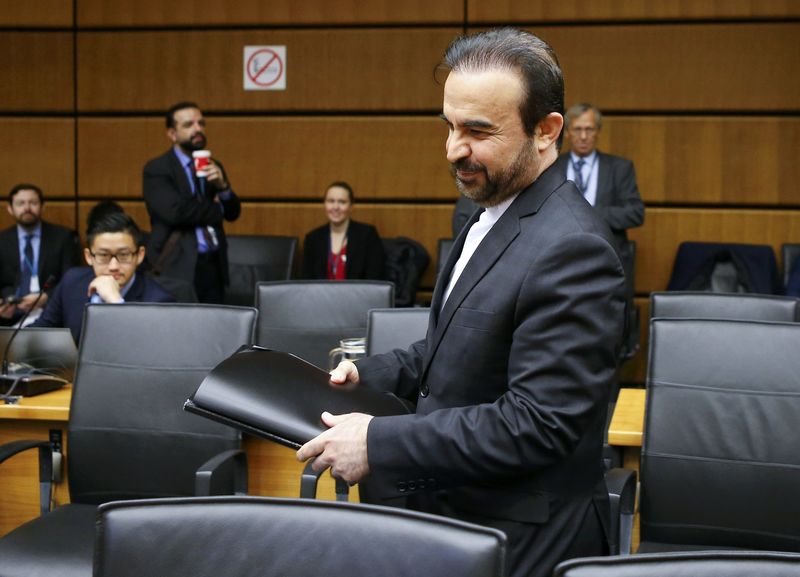By Francois Murphy and Shadia Nasralla
VIENNA (Reuters) - The U.N. nuclear watchdog's 35-nation board decided on Tuesday to close its investigation into whether Iran once had a secret nuclear weapons programme, opting to support Tehran's deal with world powers rather than dwell on its past actions.
In a symbolic victory for Iran, the International Atomic Energy Agency's (IAEA) Board of Governors passed a resolution ending its long-running inquiry but allowing inspectors to continue to police the country's nuclear programme.
"The decision by the Board of Governors today ... will open a new chapter for cooperation between Iran and the agency," Iran's ambassador to the IAEA, Reza Najafi, told reporters after the resolution was passed by consensus -- that is, unopposed.
The IAEA produced a report this month that strongly suggested Iran engaged in coordinated activities aimed at developing a nuclear bomb up until 2003, though it found no credible sign of weapons-related work beyond 2009.
Despite the finding -- the clearest indication yet by the IAEA, after 12 years of investigation, that Iran was pursuing atomic bomb capability even though it denies that accusation -- the international response to the report has been muted.
The United States, Russia, Britain, France, Germany and China reached a deal with Tehran in July under which sanctions weighing on Iran's economy will be lifted in exchange for restrictions on the Islamic Republic's atomic activities.
Those six powers want to press ahead with implementing the July accord, regarded as a breakthrough after years of increasing confrontation over the issue that raised fears of a wider Middle East war.
They hoped that the IAEA report, produced under the deal, would draw a line under the long-disputed issue of so-called "possible military dimensions" to Iran's activities.
Soon after the resolution was passed, Najafi said Tehran was racing to implement its side of the deal.
"We are intending to complete this process within two to three weeks, so accelerate the implementation day as soon as possible," he said, meaning the nuclear restrictions would be in place well before a parliamentary election in February.
IAEA Director-General Yukiya Amano, however, said his agency would then need weeks to verify that all the required measures, such as the removal of centrifuges that purify uranium and the reduction of Iran's enriched-uranium stockpile, had been taken.
Only once the Vienna-based U.N. agency's inspectors have verified that all the restrictions are in effect will international sanctions battering the Iranian economy be lifted.
"We understand that Iran is undertaking the preparatory steps at quite high speed," Amano told a news conference, adding that it was difficult to say how much additional time the IAEA would need. "Not days, not months. Weeks' time for us," he said.
SACRIFICE?
Supporters of the July deal argue that it gives the IAEA far more intrusive powers to inspect Iran's facilities and to monitor what it is doing, and that it extends the time Tehran would need to build an atom bomb if it chose to do so.
"As we close out this important chapter here today, we must remain mindful that we are not closing the agency's ability to investigate any potential concerns that may arise," U.S. envoy Henry Ensher said in the text of his speech to the IAEA board.
With companies from the six powers and other nations lining up to do business in the Islamic Republic once sanctions are lifted, there had been little opposition to the resolution.
Beyond the IAEA board, however, some have argued that a full examination of Iran's past violations of its nuclear non-proliferation obligations has been sacrificed for the sake of the political agreement clinched in Vienna.
"Iran's cooperation was certainly not sufficient to close the overall PMD file," the Washington-based Institute for Science and International Security, which closely tracks Iran's nuclear dossier, said in a statement.

The IAEA resolution asks Amano to report to the Board of Governors and the U.N. Security Council "at any time if the Director General has reasonable grounds to believe there is an issue of concern".